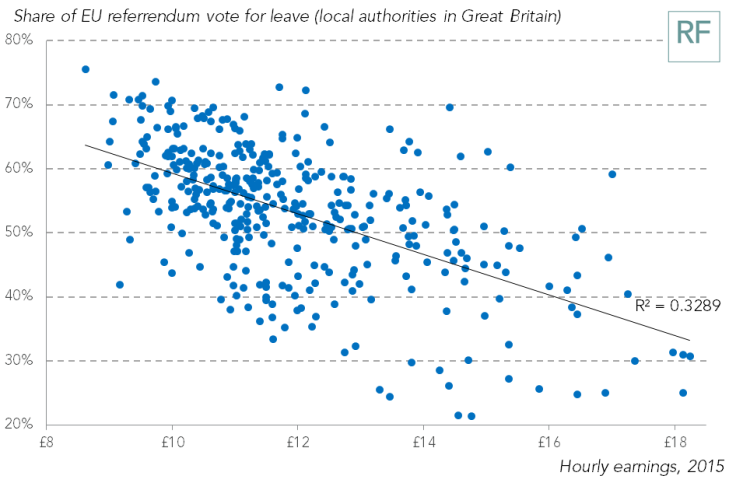Brexit: How Economics Did (And Didn’t) Affect The EU Referendum

The day after Britain voted to exit the European Union, a shocked world grasped for answers to the question: What compelled 51.9 percent of U.K. citizens to dispense with their EU membership?
Analyses conducted Friday using economic data and vote tallies show the importance of economic factors in predicting how districts voted. Income, education and age all proved to be strong determinants of support for the move to leave the EU.
With immigration and national identity emerging as crucial issues during the campaign, cultural factors also undoubtedly played central roles in the referendum outcome and can’t be disentangled from economics. But money and welfare still provide key insights into the results of the vote.
Income
Since the 2008 global financial crisis, British wages have yet to regain their previous levels. According to an analysis by the Resolution Foundation in the U.K., weekly earnings remain roughly $27 below their late-2000s peak. Some supporters of exiting the EU blamed immigration from poorer countries, Poland especially, for holding down wages.
But the Resolution Foundation found there was surprisingly little correlation between wage growth — or the lack of it — and voting preferences in the referendum. Instead, voters lined up much more reliably by overall income.

In short, the poorer a district tended to be, the more likely it was to vote for Britain to leave the EU. Still, it was not a perfect relationship.
Education
A closer relationship was centered on education level. The more highly educated a district’s residents, the more likely it was to vote for the U.K. to remain in the EU. An analysis by the Financial Times showed that this factor, above all others, best predicted how districts voted.
Among the 35 areas in Britain where more than 50 percent of residents held higher degrees, only three voted for the country to leave the EU, the Telegraph reported. Meanwhile, 28 out of the 30 least-educated regions voted for a Brexit.
Across the U.K., 57 percent of degree holders voted to remain in the EU.
Age
Some of the most striking divides in the vote came along the age spectrum, however. Younger voters overwhelmingly cast their ballots for remaining in the EU while older U.K. residents leaned toward leaving it.
Fascinating poll on Brexit. Broken down by age. @YouGov pic.twitter.com/N4XlA4lF0L #Brexit
— Farid Senzai (@Farid_Senzai) June 23, 2016
For example, 64 percent of those ages 18-24 voted to stay in the EU, YouGov polling data indicated. In contrast, those 65 years old and over produced a nearly perfect mirror image, with 58 percent voting to leave the bloc.
But before blaming their parents for the Brexit, younger Brits might first look at their peers: Data showed that turnout was lowest in areas with the highest share of young voters.

© Copyright IBTimes 2024. All rights reserved.












